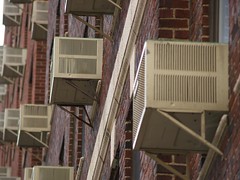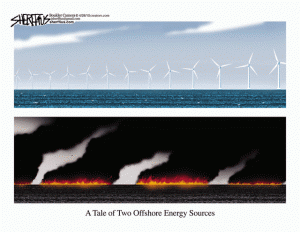 Did you know that you have the option to choose who makes your electricity? Since deregulation in 1997, NSTAR no longer generates electricity. This is why there are separate charges on your utility bill for generation and distribution.
Did you know that you have the option to choose who makes your electricity? Since deregulation in 1997, NSTAR no longer generates electricity. This is why there are separate charges on your utility bill for generation and distribution.
One of the hopes of utility deregulation in the late 90s was that it would allow for market forces to create a cleaner energy supply. The idea was that if customers were not forced to buy energy from their local utility they might express demand for less damaging electricity generation. Many academics and environmentalists were worried though, that consumers would instead focus on cost and become blind to other energy attributes, or remain ignorant of the specific ties and between power generation and the environment. This belief seems well-founded since more than five years into deregulation, fewer than 4% of Massachusetts customers had chosen competitive suppliers.
Bay State policy makers foresaw the difficulties for individuals in overcoming inertia to become informed and make the switch to another provider, an therefore included a novel clause in the deregulation act providing for something known as community choice aggregation. Community choice allows municipal governments to go through the competitive supplier selection process on behalf of all of their residents, permitting them to take advantage of the resulting collective bargaining power. Although Cambridge has not availed itself of this option, dozens of communities have, including those served by the well-known Cape Light Compact. Therefore, you are most likely receiving electricity through NSTAR’s default or standard offer service. Because NSTAR no longer runs power plants it acts as a de facto aggregator itself, and through an annual bidding process selects a provider for customers without a competitive supplier.
How green is this supply? What if you want something different? NSTAR began offering a wind-based power supply a little over two years ago, but there are other options available. At one point many businesses sought to be competitive suppliers in Massachusetts, but very few remain in the residential sector. Fortunately NSTAR provides a more up to date database of competitive suppliers. Simply search for your rate class (typically 01 for residential and 02 for small business) to obtain a list of alternative electricity suppliers.
Although it is still listed, Just Energy no longer offers service in Massachusetts. Neither Alternative Energy Resources nor Angora has publicly available information, and both did not respond to inquiries. The table below summarizes the information I was able to gather about the remaining residential competitive suppliers in Massachusetts. Prices are ¢/kWh for December 2009.
| New England Average | NSTAR | Easy Energy | Dominion | Horizon |
| Basic | Green 50 | Green 100 | Basic | Green 50 | Green 100 |
| Biomass | | | | | 6.0% | 10.1% | 12.4% | 2.1% | 0.2% |
| Hydro | 5.4% | 3.0% | 1.0% | | 8.0% | 35.5% | 74.9% | 7.1% | 1.1% |
| Solar | | | | | | 3.1% | 6.2% | | |
| Wind | | | 50.0% | 100.0% | | 3.4% | 6.4% | | 0.9% |
| “Renewables” | 3.3% | 8.0% | 5.0% | | | | | | |
|
| Incinerator | | | | | | 0.5% | | 3.0% | 0.6% |
Landfill gas | | | | | | | | 0.5% | 0.3% | | Nuclear | 14.4% | 29.0% | 15.0% | | 35.0% | 14.0% | | 28.8% | 35.6% |
| Coal | 8.9% | 16.0% | 7.0% | | 13.0% | 6.0% | | 15.8% | 53.3% |
| Diesel | | | | | | | | 2.1% | |
| Natural gas | 38.0% | 35.0% | 17.0% | | 27.0% | 16.5% | | 35.1% | 7.5% |
| Oil | 24.6% | 10.0% | 5.0% | | 11.0% | 4.5% | | 2.9% | 0.6% |
| “Other” | 5.4% | | | | | 6.5% | | 2.4% | |
| Base | | 9.22 | 9.22 | 9.22 | 8.6 | 8.6 | 8.6 | | |
| Premium | | | 0.84 | 1.4 | | 1.25 | 2.5 | | |
Sources:
 Although the expanded fleet of trucks that might eventually be passing through California’s coastal redwood in Garberville should be less polluting due to the administration’s recent move to regulate fuel efficiency of the traditionally exempt trucking fleet, they now face another threat besides vehicular NOX.
Although the expanded fleet of trucks that might eventually be passing through California’s coastal redwood in Garberville should be less polluting due to the administration’s recent move to regulate fuel efficiency of the traditionally exempt trucking fleet, they now face another threat besides vehicular NOX.








